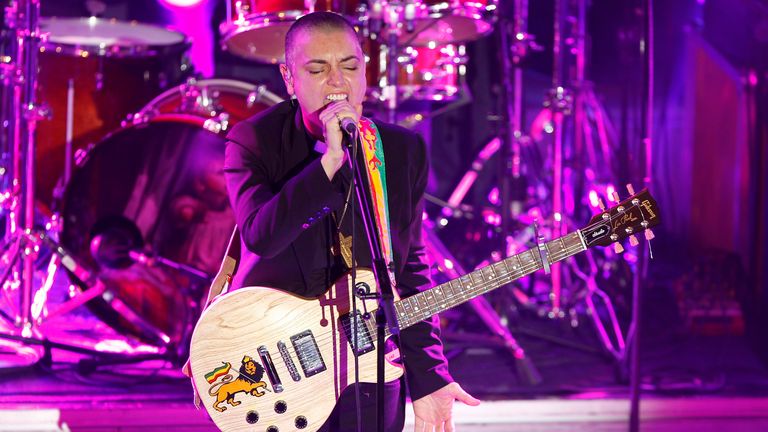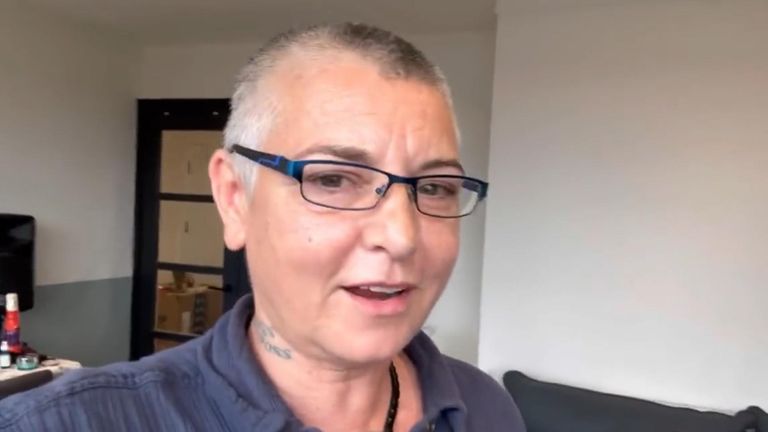Sinead O’Connor had a complicated relationship with the single that skyrocketed her to international fame.
Nothing Compares 2 U was, famously, written by Prince for The Family, but it will always be O’Connor‘s song. Like Whitney Houston’s I Will Always Love You and Amy Winehouse’s Valerie, it’s a cover that transcended the original.
Released in 1990, O’Connor’s stunning vocal performance, coupled with the video that made it one of the all-time greats, meant her version topped charts around the world.
“I love it, it’s great!” Prince reportedly said publicly of the song. “I look for cosmic meaning in everything. I think we just took that song as far as we could, then someone else was supposed to come along and pick it up.”
But O’Connor would recall in interviews that privately, the star was not happy.
Years later, after meeting Fun Lovin’ Criminals drummer and Prince fan Frank Benbini at a charity gig in Dublin, he asked her if she would record a different song for an album of Prince covers, Purple Reggae.
Released in 2014 by Radio Riddler, Benbini’s reggae side project, the album also featured collaborations with Suggs, Beverley Knight and Campbell.
But O’Connor initially declined, saying she had told herself she would never sing another Prince song.
“I discovered that she had a massive love for reggae music – which those that have followed her career will know,” Benbini tells Sky News. “We just hit it off. Obviously everybody knows Sinead really for Nothing Compares 2 U and at the time we were doing a tribute to Prince, while Prince was still alive.”
They were recording songs from the album Purple Rain, including the single, I Would Die 4 U. “That was the song I always thought Sinead would sound amazing on,” he says. “I spoke to her about it and she said: ‘I always vowed never to do another Prince song.’ But I said I’d send it anyway.”
‘She was misunderstood, nothing like how she was perceived’
O’Connor agreed and the pair swapped numbers and stayed in touch. When she eventually heard his demo, she agreed to record the version together at a studio in Dublin.
The singer was “absolutely amazing”, says Benbini. “She was obviously a troubled soul over the years and I think at times very much misunderstood. Especially by some of the press, I think some were mean to her, just simply because they didn’t understand her. But she was such a strong woman – she came from performing on the streets of Dublin busking, so she had tremendously thick skin.
“I’d heard stories about her – and I’ve worked with some famous artists in the studio, so I’m thinking, what’s this going to be like? But she was super humble and really funny. She was nothing like she’d been perceived to be over the years… there was an air of shyness about her but also an air of, she knew what she wanted, knew who she was. She didn’t have any airs or graces, she was very much down to earth, which is quite rare in rock’n’roll.”
In fact, O’Connor only asked for one thing. “A cheese sandwich. That’s all she wanted, all day. ‘I don’t want any butter on it, Frank. No butter.’ So just brown bread and cheddar cheese? That’s it? ‘Yeah.’ No problem!”
O’Connor had something that many others could learn from, he says. “A lot of new artists should take a little pinch of Sinead – and that is, you know, to always be yourself.”
Read more:
An unapologetic singer’s rise to stardom
‘Beyond compare’: Tributes paid to O’Connor
He says there was never any discussion about O’Connor singing the Prince cover that made her famous.
“I’m an uber Prince fan,” Benbini says. “But, you know, she told me one or two stories… how Prince summoned her to his house in LA at the time and he wasn’t very happy because she was doing some press on an American chat show, and she swore. He said, ‘if you’re representing my song, don’t use filthy language’.” He laughs. “She told him to do one.”
Benbini continues: “For the longest time, I think a lot of people didn’t even realise Nothing Compares 2 U was a Prince song. They just thought it was a Sinead song, because it was such a beautiful approach. The delivery is just ghostly beautiful.
“She said she’d vowed she’d never cover another Prince song. But I think coming from the world of reggae… that was really what got her to do I Would Die 4 U. It was the second time she ever did a Prince song, which I’m super proud of and it’s such a beautiful version.”
‘She’s so much more than Nothing Compares 2 U’
Despite being disappointed by her meeting with Prince, O’Connor was not bitter, telling Benbini she still had great respect for his work. “‘Don’t get me wrong, he’s the most incredible writer’, she said. She loved his songwriting, his words.”
Paying tribute, Benbini says he hopes a positive to be taken from O’Connor’s death can be people discovering, or rediscovering, her music.
“I’ve listened to [our version of] I Would Die 4 U, since finding out the news, over and over,” he says. “I’ve not listened to it for years and it’s really beautiful.
“The one thing you can take from this is that there’s a whole legacy of work she’s done – and she’s so much more than just Nothing Compares 2 U – she’s got a wealth of music. I hope people go digging now and find all the beautiful things she managed to get on record. People should celebrate her work. It’s a great way of honouring someone.”



